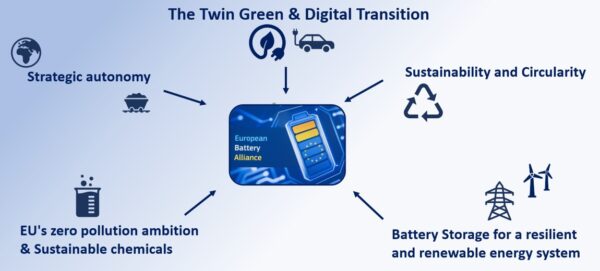
EU LEGISLATION & DIRECTIVES
A supportive regulatory framework will accelerate the transition towards a sustainable and resilient European battery value chain- from domestic raw material production to recycling. Batteries, a key technology in the green and digital transition, are therefore at the centre of EU policymaking.

Below is a selection of battery value chain related EU policy initiatives and instruments:
-
- The European Green Deal to reach climate neutrality by 2050, reduce transport emissions by 90% in 2050 and help companies become world leaders in clean products and technologies.
- The European Industrial Strategy to retain the EU as global centre for automotive & energy storage innovation and competitiveness; bolster Europe’s resilience and strategic autonomy in critical industrial sectors and support the creation & retention of skilled jobs in the EU.
- The EU’s Strategic Action Plan on Batteries puts Europe on a firm path towards leadership in a key industry for the future, supporting jobs and growth in a circular economy, whilst ensuring clean mobility and an improved environment and quality of life for EU citizens. It has been developed in close consultation with stakeholders including industry and Member States in the framework of the ‘European Battery Alliance’ and builds on the industry-led approach whereby EU industry players have themselves adopted and are starting to implement targeted actions.
- The Circular Economy Action Plan with initiatives along the entire life cycle of products. It targets how products are designed, promotes circular economy processes, encourages sustainable consumption, and aims to ensure that waste is prevented and the resources used are kept in the EU economy for as long as possible.
- The EU Battery Regulation, a new law adopted in July 2023 that brings forward the circular economy and zero pollution ambitions of the EU and strengthens the EU’s strategic autonomy. This will minimise the environmental impact of this exponential growth in light of new socioeconomic conditions, technological developments, markets, and battery usages.
- The Mobility Strategy providing various policies to support zero-emission mobility.
- The Fit for 55 package with proposals to reduce emissions by at least 55% by the end of this decade. The ‘Fit for 55’ legislation sets the EU on a path to reach its climate targets by 2030 in a fair, cost effective and competitive way.
- The European Climate Law sets the intermediate target of reducing net greenhouse gas emissions by at least 55% by 2030, compared to 1990 levels. The law aims to ensure that all EU policies contribute to this goal and that all sectors of the economy and society play their part.
- The Temporary Crisis and Transition Framework loosening of state aid guidelines, possibility to match foreign aid if there’s a risk of an EU company leaving the EU.
- The Critical Raw Materials Act addresses supply chain vulnerabilities with targets for domestic production and diversified supply chains including 2030 benchmarks, definition of strategic projects and increased collection of waste products.
- The European Economic Security Strategy, a proposal for a new Regulation to establish a Strategic Technologies for Europe Platform (‘STEP’).
- The Net Zero Industry Act simplifies the regulatory framework and permitting for net-zero technologies including targets for cleantech industrial capacity.
- REPowerEU to help to EU save energy, produce clean energy and diversify its energy sources.
Read the latest news
European Battery Alliance welcomes €852 million in swift EU funding
July 7, 2025
The European Battery Alliance (EBA) welcomes the European Commission’s swift decision to award €852…
New EU state aid framework published: What CISAF means for the battery ecosystem
July 2, 2025
Last week, the European Commission published the Clean Industrial Deal State Aid Framework (CISAF),…
EBA250 leadership transition: Emma Nehrenheim appointed Managing Director
June 10, 2025
We are pleased to welcome Emma Nehrenheim as new Managing Director of the European…